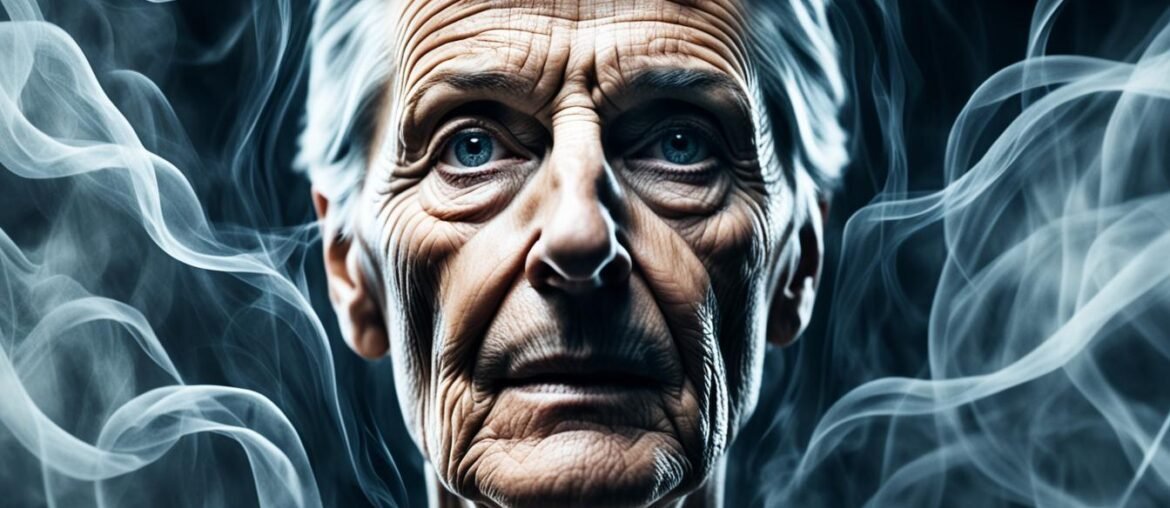Did you know that a high-stress lifestyle can make a person appear up to 3.5 years older? According to a clinical study, the constant flood of stress hormones, such as cortisol, can lead to dehydration, sallowness, roughness, and deep expression lines in the skin. Stress-induced wrinkles and stress-related skin aging are real concerns that many people face in today’s fast-paced world.
But don’t worry, there are effective ways to combat the visible signs of stress on your skin. By implementing a comprehensive approach that includes stress reduction techniques and an optimal skincare routine, you can protect your skin against stress and maintain a youthful complexion.
Key Takeaways:
- Stress can have a significant impact on the aging process of the skin, causing dehydration, sallowness, roughness, and deep expression lines.
- Combatting stress-induced skin aging requires a comprehensive approach, including stress reduction techniques and an effective skincare routine.
- Proper stress management and targeted skincare can help reverse stress-related skin aging and maintain healthy, youthful-looking skin.
- Understanding the role of telomeres, oxidative stress, and gene expression in stress-related skin aging provides insights into potential strategies for combatting these effects.
- By addressing stress and implementing effective skincare strategies, you can combat the visible signs of stress-induced skin aging and promote overall skin health.
How Stress Affects the Skin
Stress-induced aging can take a toll on our skin, which acts as the body’s largest living organ. When we experience stress, our body releases stress hormones such as cortisol, leading to various skin issues.
One of the common effects of stress on the skin is dehydration. Stress hormones can interfere with the skin’s ability to retain moisture, resulting in dry, dull skin. This dehydration can also contribute to sallowness, giving the skin a yellowish or pale appearance.
Additionally, stress can make the skin appear rough and uneven. The increased levels of cortisol can impair the skin’s natural barrier function, leading to a compromised skin texture.
Quote: “Stress not only affects our mental and emotional well-being but can also impact our skin. The release of stress hormones like cortisol can have significant implications for the health and appearance of our skin.” – Dr. Emily Thompson, Dermatologist
Another visible effect of stress on the skin is the formation of deep expression lines. Stress hormones can cause the facial muscles to tense up, resulting in the development of lines and wrinkles, commonly known as “worry lines” or “stress lines”. These lines can age the skin prematurely, making it appear older than it actually is.
To summarize, stress can lead to skin issues such as dehydration, sallowness, roughness, and expression lines. These effects can contribute to premature aging of the skin, making it essential to address stress-induced skin aging through effective skincare and stress management techniques.
| Stress-Induced Skin Issues | Description |
|---|---|
| Dehydration | Stress hormones can hinder the skin’s ability to retain moisture, resulting in dry, dull skin. |
| Sallowness | The release of stress hormones can give the skin a yellowish or pale appearance. |
| Roughness | Stress can impair the skin’s natural barrier function, leading to an uneven and rough skin texture. |
| Expression Lines | Stress can cause facial muscle tension and the formation of deep lines and wrinkles. |
Tips to Reverse Stress Skin Aging

To combat stress-related skin aging, it is essential to both control stressors and incorporate a proper skincare routine.
Nourishing the mind through stress reduction techniques like meditation can have a positive impact on the skin. Taking a few minutes each day to focus on deep breathing and calming the mind can help reduce stress levels and promote overall well-being.
Regular exercise is not only beneficial for the body but also for the skin. Engaging in physical activities boosts circulation, which helps deliver nutrients and oxygen to the skin cells. It also promotes the production of endorphins, which are known as “feel-good” hormones that can reduce stress levels.
A healthy diet filled with nutrient-dense foods is vital for reversing stress-related skin aging. Incorporate fruits, vegetables, whole grains, and lean proteins into your meals to provide the skin with essential vitamins, minerals, and antioxidants. These nutrients nourish the skin from within and help combat the damaging effects of stress.
Using stress-reducing skincare products can also play a significant role in reversing the signs of stress aging. Look for ingredients like neuropeptides, wild indigo, and hyaluronic acid, which can help address visible skin wrinkling, calm the skin’s stress signals, and provide hydration.
Remember, a comprehensive approach that includes nourishing the mind, exercise, a healthy diet, and stress-reducing skincare products is key to reversing stress skin aging.
Key Tips to Reverse Stress Skin Aging:
- Nourish the mind through stress reduction techniques like meditation
- Incorporate regular exercise to promote circulation and overall well-being
- Follow a healthy diet focusing on nutritious, vitamin-dense foods
- Use stress-reducing skincare products with effective ingredients
The Role of Telomeres in Stress-Related Skin Aging
Telomeres play a significant role in the aging process, including stress-related skin aging. Telomeres are protective caps at the ends of chromosomes that shorten when cells divide. Stress is a leading cause of telomere shortening, which can result in a thinning of the dermis, a decrease in collagen and elastin fibers, and ultimately, skin sagging and the formation of wrinkles.
When cells divide, telomeres become shorter, and over time, this shortening process contributes to cellular aging. As telomeres shorten, the cells’ ability to divide and regenerate diminishes, leading to a decline in the overall health and vitality of the skin. The dermis, the middle layer of the skin responsible for strength and elasticity, is particularly affected by telomere shortening. Collagen fibers, which provide structural support, become less abundant, while elastin fibers, responsible for the skin’s ability to stretch and snap back, lose resilience.
The consequences of telomere shortening manifest externally as signs of aging, including skin sagging and wrinkles. As the dermis thins and loses collagen and elastin, the skin becomes less firm and supple, leading to sagging and the formation of wrinkles. These changes are often accelerated by stress, as it can expedite the telomere shortening process, further exacerbating the aging of the skin.
Understanding Telomere Shortening
When telomeres reach a critically short length, they trigger a cellular response known as senescence, in which a cell becomes dormant and ceases to divide. This process serves as a protective mechanism to prevent the replication of damaged cells and the potential for cancerous growth. However, cellular senescence also contributes to the overall aging of the skin.
Additionally, telomere shortening can lead to the activation of pro-inflammatory genes and the development of chronic low-grade inflammation. This inflammation further accelerates skin aging and contributes to the breakdown of collagen and elastin fibers.
To better understand the role of telomeres in stress-related skin aging, extensive research is being conducted to explore potential interventions or treatments that could slow down or reverse the telomere shortening process. These studies aim to identify strategies that can preserve telomere length, enhance cellular function, and mitigate the visible signs of skin aging caused by stress.
| Effects of Telomere Shortening on the Skin | Evident Symptoms |
|---|---|
| Thinning of the dermis | Loss of skin density and firmness |
| Decrease in collagen fibers | Formation of wrinkles and fine lines |
| Loss of elastin fibers | Sagging and lack of skin elasticity |
Impact of Stress on the Skin Barrier

The skin barrier serves as the outermost layer of the skin’s surface, playing a critical role in protecting against toxins and maintaining hydration. It acts as a shield, safeguarding the skin from external aggressors and preventing moisture loss. However, stress can disrupt the normal functioning of the skin barrier, leading to detrimental effects on skin health.
One of the primary consequences of stress interference with the skin barrier is dry skin. When stress hormones like cortisol are released, they can impair the skin’s ability to retain moisture, resulting in dry, dehydrated skin. This lack of hydration can cause the skin to feel tight, rough, and uncomfortable.
Furthermore, stress-induced disruptions to the skin barrier can contribute to the appearance of visible lines and wrinkles. The compromised barrier function may allow for increased transepidermal water loss, leading to a loss of plumpness and elasticity in the skin. Over time, this can manifest as fine lines and wrinkles, making the skin look aged and tired.
The Effects of Stress on the Skin Barrier
Stress interferes with the skin barrier in several ways, including:
- Disruption of the skin’s natural lipid barrier, which helps to seal in moisture and protect against environmental aggressors.
- Impaired production of ceramides, essential components of the skin barrier that help maintain its integrity and hydration.
- Inflammation-induced damage to the skin barrier, compromising its ability to function optimally.
“When the skin barrier is compromised, it not only affects the skin’s appearance but also leaves it vulnerable to external irritants and allergens,” explains Dr. Emily Williams, a dermatologist at SkinCare Clinic. “This can exacerbate existing skin conditions like eczema and rosacea, leading to further discomfort and inflammation.”
To support and maintain a healthy skin barrier, it is crucial to adopt a skincare routine that focuses on strengthening and nourishing the skin. This includes incorporating products with ingredients that promote barrier function, such as ceramides, hyaluronic acid, and natural moisturizing factors (NMFs).
| Effects of Stress on the Skin Barrier | Recommendations |
|---|---|
| Dry, dehydrated skin | Hydrate the skin with moisturizers enriched with ceramides and hyaluronic acid. |
| Visible lines and wrinkles | Use products containing collagen-boosting ingredients like peptides and retinol to improve skin firmness. |
| Inflammation and sensitivity | Choose gentle skincare products without harsh irritants and ensure proper sun protection. |
“Maintaining a healthy skin barrier is essential for protecting against environmental stressors and preserving optimal skin health,” says Dr. Williams. “By adopting a skincare regimen that focuses on barrier repair and protection, individuals can help mitigate the negative effects of stress on their skin.”
By implementing a comprehensive skincare routine that targets the skin barrier and incorporates stress-reducing techniques, individuals can counteract the detrimental effects of stress interference on the skin. Taking proactive steps to support and strengthen the skin barrier is vital for maintaining a youthful, healthy complexion.
Oxidative Stress and Stress-Related Skin Aging
Stress, whether emotional or environmental, can have detrimental effects on our overall health, including our skin. One of the key mechanisms through which stress affects the skin is oxidative stress. This occurs when there is an imbalance between free radicals and antioxidants in the body.
Free radicals are highly reactive molecules that can cause damage to cells, including those in the skin. Under normal circumstances, the body’s antioxidant defenses neutralize these free radicals, preventing harm. However, during times of stress, these defenses can become overwhelmed, leading to oxidative stress.
Oxidative stress has been linked to various health issues and is a common factor in the visible signs of aging, such as pigmented spots, wrinkles, and skin sagging. The skin, as the body’s outermost barrier, is particularly susceptible to the damaging effects of oxidative stress.
To combat the effects of oxidative stress on the skin, incorporating an antioxidant-rich diet is key. Antioxidants help neutralize free radicals, reducing their harmful impact on the skin. Some examples of antioxidants that can support skin health include vitamins C and E, beta-carotene, and resveratrol.
Additionally, topical skincare products containing antioxidants can provide targeted protection against oxidative stress. These products can help fortify the skin’s natural defenses and promote a more youthful, radiant complexion. Look for ingredients such as green tea extract, vitamin C, and coenzyme Q10.
By addressing oxidative stress and incorporating a comprehensive approach to skincare that includes antioxidants, we can protect our skin from the visible signs of aging and promote a healthier, more resilient complexion.
The Role of Antioxidants in Skincare
Antioxidants play a crucial role in skincare by neutralizing free radicals and counteracting the effects of oxidative stress. They help protect the skin from damage, reduce inflammation, and support collagen production. Here are some key benefits of incorporating antioxidants into your skincare routine:
- Fights Visible Signs of Aging: Antioxidants help combat the appearance of wrinkles, pigmented spots, and skin sagging.
- Enhances Skin Radiance: Antioxidants promote a more youthful, glowing complexion.
- Reduces Inflammation: Antioxidants have anti-inflammatory properties that can soothe and calm the skin.
- Improves Skin Texture: Antioxidants support collagen production, which can help improve the overall texture and firmness of the skin.
- Protects Against Environmental Damage: Antioxidants act as a shield, protecting the skin from the damaging effects of environmental pollutants and UV radiation.
By incorporating antioxidants into your skincare routine, you can help protect your skin from oxidative stress and maintain a more youthful, radiant appearance.
Glycation and its Relationship to Stress
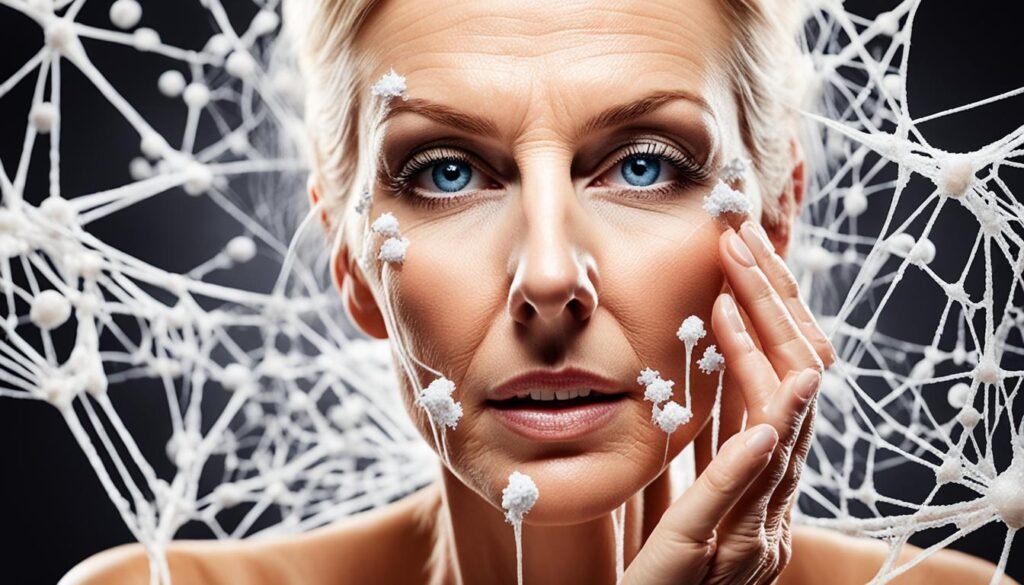
Glycation is a natural process that occurs in the body when sugar molecules in the blood bond to proteins, including collagen. This bonding is known to lead to collagen rearrangement, which can result in a loss of skin elasticity and a decline in a youthful appearance.
Stress, especially chronic stress, can contribute to glycation by triggering the release of cortisol, a stress hormone. Cortisol inhibits insulin, which in turn releases sugar molecules into the bloodstream. This increased sugar availability can further accelerate the glycation process and its negative effects on the skin.
To mitigate the impact of glycation on the skin and maintain a youthful appearance, it is crucial to limit sugar intake. By reducing the consumption of sugary foods and beverages, individuals can minimize the amount of sugar available in the bloodstream to bond with proteins like collagen. This can help preserve skin elasticity and prevent premature aging.
Implementing a balanced diet with a focus on whole, unprocessed foods can also promote skin health and counteract the effects of glycation. Choosing foods rich in antioxidants, such as fruits, vegetables, and nuts, can provide additional protection against glycation and its consequences.
By understanding the relationship between glycation and stress, individuals can make informed choices about their diet and lifestyle to maintain a youthful and resilient complexion.
Tips for Controlling Stress-Related Skin Aging
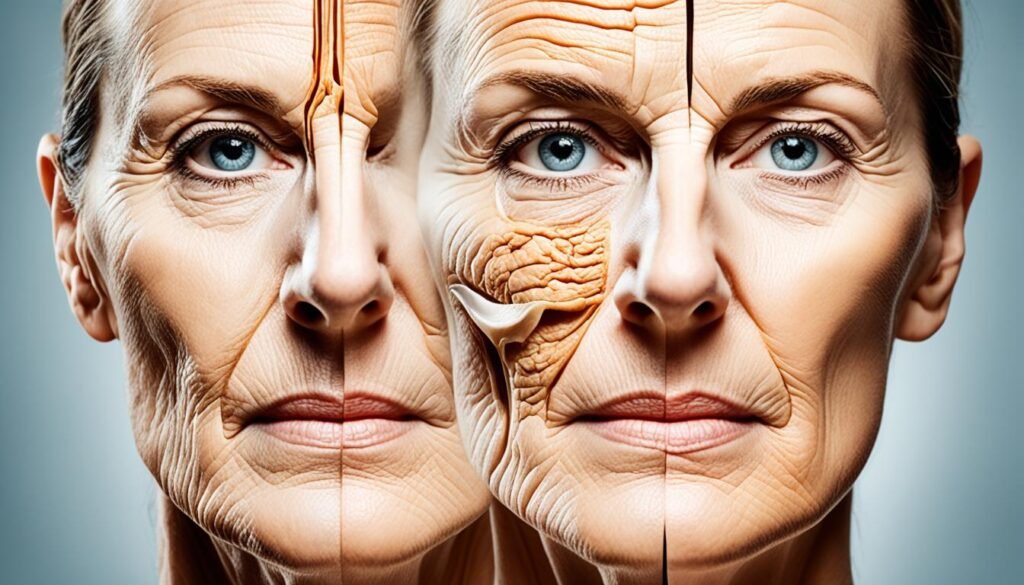
Controlling stress-related skin aging requires a comprehensive approach that addresses both stress management and skincare. Here are some tips to help you maintain healthy, youthful skin:
1. Engage in Stress Management Techniques
Combat the negative effects of stress by incorporating stress-reducing activities into your daily routine. Engaging in hobbies, practicing meditation, and regular exercise can help alleviate stress and promote overall well-being.
2. Follow a Skin-Friendly Diet
Avoid sugary and processed foods that can contribute to skin aging. Instead, opt for a skin-friendly diet rich in antioxidants and essential nutrients. Incorporate fresh fruits and vegetables, lean proteins, whole grains, and healthy fats into your meals to nourish and support your skin’s health.
3. Protect Your Skin from UV Rays
UV rays contribute to premature aging and can worsen the effects of stress on the skin. Protect your skin by wearing sunscreen with at least SPF 30 every day, even on cloudy days. Additionally, seek shade, wear protective clothing, and avoid sun exposure during peak hours to minimize UV damage.
4. Consult with a Primary Care Physician
Your primary care physician can provide valuable guidance on stress management techniques and assess your overall health. They can also recommend skincare products and treatments suitable for your skin type and conditions, ensuring optimal care for stress-related skin aging.
| Stress-Related Skin Aging Tips | Benefits |
|---|---|
| Engage in stress-reducing activities | Reduces stress levels and promotes overall well-being |
| Follow a skin-friendly diet | Nourishes the skin with essential nutrients and antioxidants |
| Protect your skin from UV rays | Prevents UV damage and premature aging |
| Consult with a primary care physician | Obtain guidance on stress management and personalized skincare recommendations |
Research on Telomeres and Skin Aging
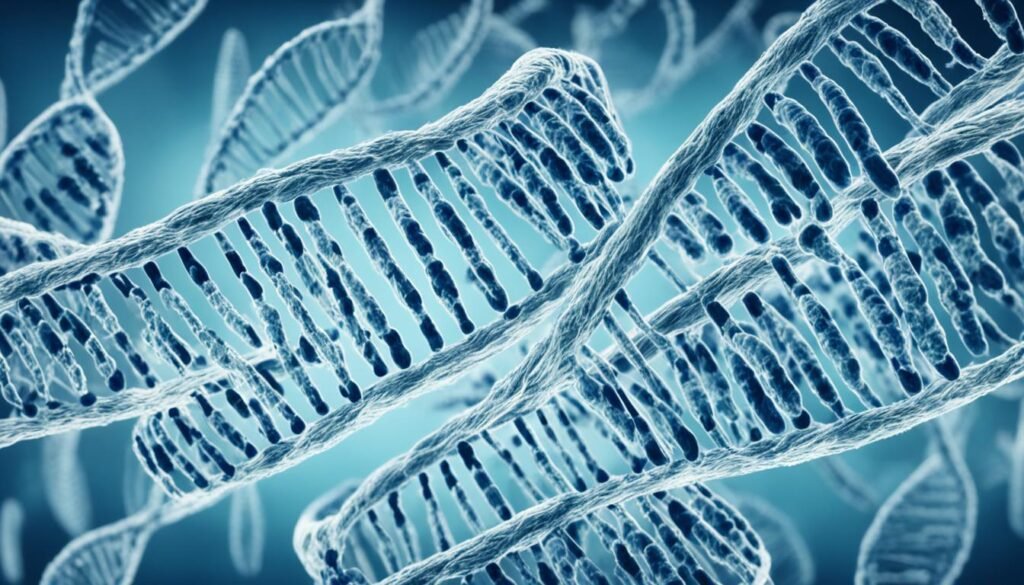
Research has shown a strong correlation between telomeres and skin aging. Telomeres, the protective caps at the ends of chromosomes, play a critical role in maintaining cellular function and DNA stability. Telomere dysfunction has been linked to various age-related conditions, including skin aging.
Telomere shortening, which occurs naturally with each cell division, can be accelerated by various factors, including stress. The accumulation of DNA damage, mitochondrial compromise, and cellular senescence are consequences of telomere dysfunction. These processes contribute to the aging of the skin, such as the loss of elasticity, firmness, and the appearance of wrinkles.
“Telomere dysfunction can lead to DNA damage, mitochondrial compromise, and cellular senescence, all of which contribute to the aging process.”[1]
Understanding the role of telomeres in skin aging provides valuable insights into potential strategies for combating stress-related skin aging. By targeting telomere maintenance and promoting cellular health, it may be possible to slow down the aging process and maintain a more youthful appearance.
Effects of Telomere Dysfunction on Skin Aging
| Telomere Dysfunction | Effects on Skin Aging |
|---|---|
| DNA Damage | Accelerated aging, impaired cellular function |
| Mitochondrial Compromise | Decreased energy production, impaired cellular function |
| Cellular Senescence | Loss of cellular division potential, decreased tissue repair |
By addressing the underlying factors that contribute to telomere dysfunction, such as stress, it may be possible to slow down the aging process and improve the overall health and appearance of the skin. Further research in this field is necessary to develop targeted interventions and therapies for stress-related skin aging.
References
- Ding L, Chen J, Zhong Z, et al. The role of telomeres and telomerase in skin aging and skin cancer. Cancer Cell Int. 2021;21(1):196. https://doi.org/10.1186/s12935-021-01933-7
The Link Between Stress and Oxidative Stress

Stress can activate the body’s stress response system, leading to oxidative stress. When the body is under stress, it produces stress hormones that can trigger an imbalance between free radicals and antioxidants, resulting in oxidative stress.
Oxidative stress occurs when there is an excess of free radicals, which are unstable molecules that can cause damage to cells and tissues. In response to oxidative stress, the body’s immune system may initiate an inflammatory response to try to repair the damage.
This increased inflammation can further exacerbate the effects of stress on the body, creating a harmful cycle. Chronic oxidative stress and inflammation have been linked to a range of health issues, including accelerated aging and the development of chronic diseases.
To counteract the damaging effects of oxidative stress, it is important to enhance the body’s antioxidant defenses. Antioxidants help neutralize free radicals, reducing the risk of cell damage and inflammation. Incorporating antioxidant-rich foods into your diet, such as fruits, vegetables, and nuts, can provide the body with the necessary nutrients to combat oxidative stress.
Lifestyle changes, such as reducing exposure to environmental toxins and practicing stress management techniques like meditation or deep breathing exercises, can also help support the body’s antioxidant defenses and reduce oxidative stress.
The Effects of Stress-Induced Oxidative Stress:
- Accelerated aging
- Inflammation
- Cellular damage
- Impaired immune response
By recognizing the link between stress and oxidative stress, we can take proactive steps to minimize the negative impacts on our health. Prioritizing stress management, adopting a healthy lifestyle, and ensuring adequate antioxidant intake can help protect against oxidative stress and its harmful effects on the body.
| Effects of Stress and Oxidative Stress | Ways to Mitigate |
|---|---|
| Accelerated aging | Following a healthy lifestyle and skincare routine |
| Inflammation | Reducing exposure to stressors and practicing stress management techniques |
| Cellular damage | Incorporating antioxidant-rich foods into the diet |
| Impaired immune response | Adopting a healthy lifestyle and supporting the immune system |
The Impact of Stress on Gene Expression
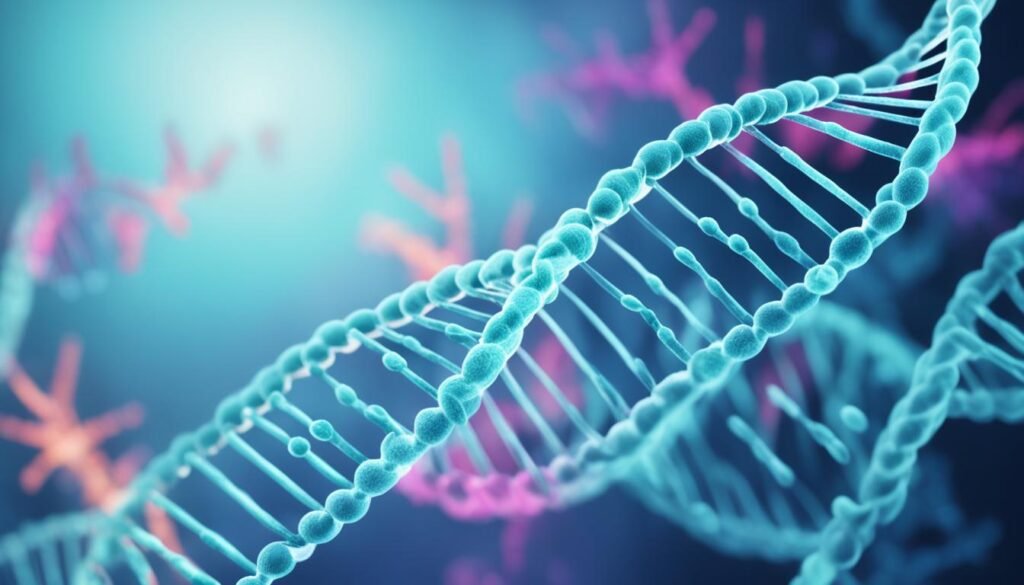
Stress has a profound impact on gene expression, leading to significant changes in DNA damage response, inflammatory markers, and cellular senescence. Understanding how stress affects gene expression provides valuable insights into the underlying mechanisms of stress-related skin aging. By unraveling these molecular pathways, we can potentially develop targeted interventions to combat the signs of stress-induced skin aging.
When we experience stress, our body’s stress response system triggers a cascade of physiological changes, including alterations in gene expression. This can result in the activation of stress-related genes responsible for initiating the DNA damage response, triggering inflammatory pathways, and promoting cellular senescence.
Research has shown that chronic stress can lead to increased DNA damage and decreased DNA repair capacity. This heightened DNA damage response contributes to the aging process by accelerating cellular dysfunction and compromising the overall integrity of the skin.
“Stress-induced changes in gene expression can lead to the activation of inflammatory pathways, contributing to the development of skin aging markers such as wrinkles, sagging, and pigmentation irregularities.”
Additionally, prolonged exposure to stress can result in the upregulation of genes associated with pro-inflammatory cytokines and chemokines. This chronic low-grade inflammation can contribute to the breakdown of collagen and elastin fibers, leading to the loss of skin elasticity and the formation of wrinkles.
Moreover, stress-induced alterations in gene expression can disrupt cellular homeostasis, leading to the activation of cellular senescence pathways. Cellular senescence is a state of irreversible growth arrest that can result in the accumulation of senescent cells in the skin tissue. These senescent cells secrete a range of harmful proteins and inflammatory factors, further contributing to the aging process and promoting the development of age-related skin conditions.
To illustrate the impact of stress on gene expression, consider the following table:
| Impact of Stress on Gene Expression | Gene Expression Changes |
|---|---|
| Inflammatory markers | Upregulation of pro-inflammatory cytokines and chemokines |
| DNA damage response | Increased DNA damage and compromised repair capacity |
| Cellular senescence | Activation of senescence-associated pathways |
This table highlights the specific gene expression changes that occur in response to stress. It demonstrates the upregulation of inflammatory markers, the compromised DNA damage response, and the activation of cellular senescence pathways.
Understanding the intricate relationship between stress and gene expression is crucial for developing effective strategies to mitigate stress-related skin aging. By targeting these molecular pathways, we can potentially introduce interventions that counteract the negative effects of stress on the skin, promoting a healthier, more youthful complexion.
Conclusion
Combatting skin aging caused by stress requires a holistic approach that addresses both stress management and optimal skincare routine. By implementing stress reduction techniques, such as meditation and exercise, alongside a skincare regimen that incorporates stress-reducing ingredients, it is possible to effectively combat the visible signs of stress-induced skin aging and maintain a healthy, youthful complexion.
Stress is a leading cause of premature aging, impacting the skin’s appearance and accelerating the formation of wrinkles, roughness, and dehydration. To counteract these effects, it is essential to reduce stress levels through relaxation techniques and engage in activities that promote mental well-being.
In addition to stress management, adopting an optimal skincare routine is crucial. Incorporating products with stress-reducing ingredients like neuropeptides, wild indigo, and hyaluronic acid can help address visible skin wrinkling, calm the skin’s stress signals, and provide much-needed hydration.
In conclusion, combatting skin aging caused by stress requires a comprehensive approach that encompasses stress management and an effective skincare routine. By prioritizing stress reduction techniques and incorporating stress-reducing ingredients into your skincare regimen, you can protect your skin against stress-induced aging and maintain a youthful, healthy complexion.
FAQ
How does stress affect the skin?
Stress can lead to various skin issues such as dehydration, sallowness, roughness, and the formation of deep expression lines.
What can I do to reverse stress skin aging?
To combat stress-related skin aging, it is important to control stressors and incorporate a proper skincare routine, including stress reduction techniques, exercise, a healthy diet, and stress-reducing skincare products.
Telomeres play a significant role in the aging process and can result in a thinning of the dermis, a decrease in collagen and elastin fibers, and ultimately, skin sagging and the formation of wrinkles.
How does stress impact the skin barrier?
Stress can interfere with the functioning of the skin barrier, leading to dry skin and the appearance of visible lines and wrinkles.
Oxidative stress occurs when there is an imbalance between free radicals and antioxidants in the body. Stress can contribute to oxidative stress, leading to various visible signs of aging such as pigmented spots, wrinkles, and skin sagging.
What is glycation and how does stress affect it?
Glycation is the process by which sugar molecules in the blood bond to proteins, including collagen, resulting in a loss of skin elasticity. Stress can contribute to glycation as the body releases cortisol, which inhibits insulin and releases sugar molecules into the blood.
Tips for controlling stress-related skin aging include stress management techniques, engaging in hobbies, meditation, exercise, a skin-friendly diet, UV protection, and consulting with a primary care physician.
What does research say about the link between telomeres and skin aging?
Research has shown the correlation between telomeres and skin aging. Telomere dysfunction can lead to DNA damage, mitochondrial compromise, and cellular senescence, all of which contribute to the aging process.
How does stress relate to oxidative stress?
Stress can activate the body’s stress response system, leading to oxidative stress. Oxidative stress is an imbalance between free radicals and antioxidants, resulting in increased inflammation and damage to cells.
How does stress impact gene expression?
Stress can influence gene expression, leading to changes in DNA damage response, inflammatory markers, and cellular senescence, which contribute to stress-related skin aging.
What is the key to combatting skin aging caused by stress?
Combating skin aging caused by stress requires a multi-faceted approach, including stress management techniques and an optimal skincare routine.

